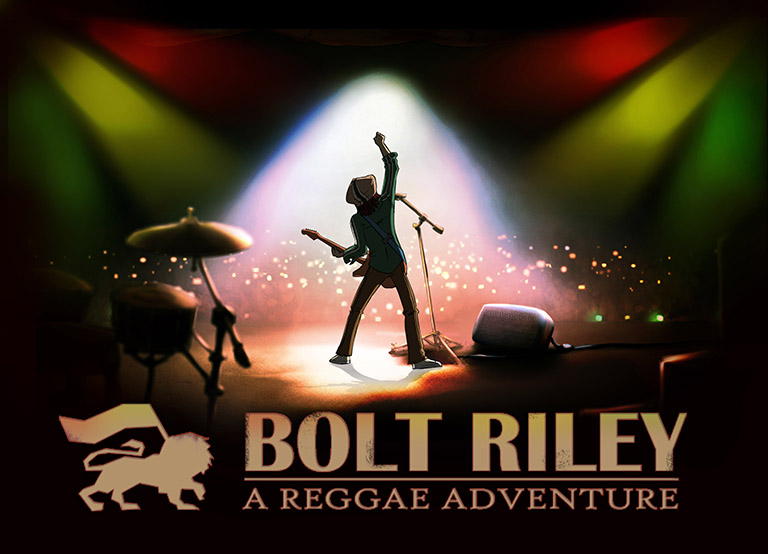Five years in the making, Bolt Riley: A Reggae Adventure Game was recently released. Set in Jamaica in the 1970s, it tells the story of the titular main character who wants to become a reggae star. Bolt Riley is a point-and-click adventure game set in the Caribbean with a soundtrack tinged with local flavor, which despite the different subject matter and time period, is evocative of the seminal Monkey Island series. Creator Oded Sharon is open in saying that Monkey Island is an inspiration for the Bolt Riley game.
“Yes, I’m a huge fan of both Monkey Island and its creator Ron Gilbert. In fact, Monkey Island is the game that inspired me the most when becoming a game developer,” said Oded. “I was actually one of the first people online to do a crowdfunding campaign, a joke website called ‘Buy a car for Ron Gilbert’ which raised money to buy Ron Gilbert a car. We ended up raising enough money to actually buy Ron a toy car which I gave to him at GDC 2008.”
“Growing up with these games, it was a big source of our inspiration when initially designing and producing the game and its soundtrack, while remaining true to our own unique 1970 Jamaica story line,” Oded added.
The Indie Prize Difference
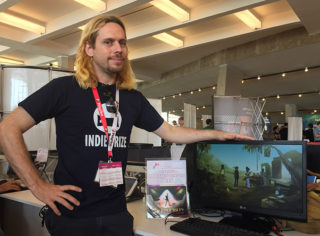
What gave Bolt Riley a shot in the arm in 2015 was winning two of Casual Connect’s Indie Prize Awards. The game took both the Best in Show, Audience Choice and Best Game Audio awards.
“I loved Indie Prize. I participated both in Amsterdam and in my home town of Tel-Aviv,” detailed Oded. “I’ve known about the prize for a while, as I have been attending Casual Connect since 2007 or so. The best experiences I had including bonding with other indie developers, getting to show my game to publishers and other event participants and of course, winning two awards. We proudly display these awards everywhere - on our website, on our steam page, etc…”
Crowdfunding Helps Adventure Games
In 2014, Oded used Kickstarter to help secure the funds needed to finish Bolt Riley. While it’s gotten harder to secure crowdsourced funding than it was a couple of years ago, Oded still sees crowdsourcing as a viable resource for indie developers
“While Kickstarting your game got a lot harder since the game development portion of it started growing with Double Fine Adventure, it is a viable platform to gauge the market [and] see if there is an interest from the audience,” Oded said. “It is also a good way to check if the team behind the game actually has good marketing abilities, as they will need the same skills to later market their game once it’s complete, be it Steam or mobile platforms. This is also part of my advice (I gave an entire talk about crowdfunding in CC Amsterdam over a year ago) - make sure you have a big enough community, or a way to build one during the campaign, and make it about the community and the backers.”

“Funding is always an issue. Especially with adventure games,” they noted. “Publishers all went for F2P games in recent years and adventure games mostly get funded through Kickstarter. Luckily we found a good opportunity with OUYA’s ‘free the games’ fund which later was bought by Razer, and now Bolt Riley is on Razer Forge and plays very well there. This will give us the option to also be on iOS and Android with minimal efforts.”

When asked why they’re choosing to focus on adventure games, Oded responded, “I just love adventure games, those are the games I like playing the most and I would prefer to work on a game that I would want to play. I think that adventure games gives you the best possible way to explore an interactive narrative.”
Indie Adventure Games All the Way
Being an indie developer isn’t easy, and Oded says that persistence is one of the more important qualities to have. While there will be failures along the road, it’s important to learn from those mistakes and to not repeat them. A decade’s worth of experience means Oded has seen plenty of failures, but notes that’s ultimately helped them succeed.
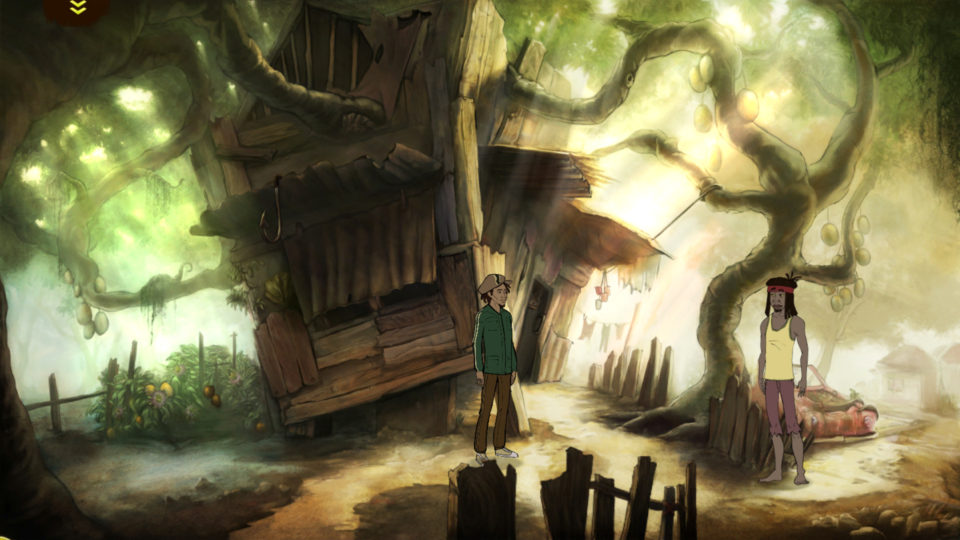
“I’ve always wanted to be a game developer since I was very young, and my favorite genre is Adventure Games, so it would make perfect sense to make adventure games,” they said. “When designing a game I like tapping into my artistic soul and do games I would want to play, and not necessarily games that would satisfy some publisher’s KPI or metrics and be a mindless money generator. This is how I started my other projects like Herbert’s Quest, or my game jam projects like Uniform or The Conpiratea.”
Appropriate to their indie experience, if they had access to more resources they would make something like what they’ve already made, but expand it out vastly. “I would try to take the adventure game / interactive storytelling / narrative heavy games to a new level by researching and playtesting new ideas,” Oded explained. “I would want to do more games that deal with love, romance, and sexuality, which are topics that are still taboo in the games market.”
The Trials and Travail of Indie Development
When originally designing Bolt Riley, five designers and Oded hashed out both the gameplay and three-act story structure. Then the group split up and designed each separate part, supervised by Oded. After the Kickstarter, Oded redesigned parts of the game once they received feedback from the players.
“We used to have a physical office where most of the people who worked on the game were in the same space,” they noted. “After losing a significant source of our funding, we had to minimize and now we’re working online. We’re using tools like Facebook chat, Google hangouts, Trello, and GIT to collaborate. This has proven to be very effective if it’s the right type of people who know how to work this way, that are self driven, and don’t require a boss over their heads so they would work.”
Perhaps a reflection of their funding issues, Oded said indie developers should be cautious of bad publishers. “We were burnt twice because of that and that almost caused us to go bankrupt,” Oded said.
When asked about tools, Oded named a few that they used to help make the game. “We use a few important pieces of software: Unity, Adventure Creator for Unity to make the gameplay and logic, and then Dialogue System for Unity in tandem with Chat Mapper to create dialog,” they said. “We make a prototype with some placeholder art, play through it, and then replace the art with something more final.”
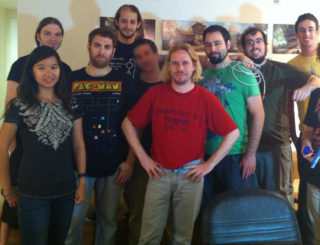
On the playtesting side of things, Oded tries to get started as soon as possible, “Usually during the development I get a working prototype as soon as I can,” they described. “I play it, I let other teammates play it and I let friends and strangers play it, and I collect their feedback. I observe their behavior and I iterate to make the game better.”
Archer: Always a Good Inspiration
Oded hopes that their particular Israeli style and sense of humor will come out through the game. They hope that they will bring this special sort of spirit to the industry which isn’t particularly prevalent right now. Oded even called out a particular funny moment in Bolt Riley that they were proud of.
“Chapter 2 of the game has a very surprising and hilarious chain reaction that happens when you do a series of things,” they said. “I don’t want to spoil the joke but it’s certainly something to expect in the Trenchtown marketplace.”

When it comes to the art style, Oded said they drew on games like the beautifully animated The Curse of Monkey Island and recent TV shows like Archer. They went for a style with simple cartoon characters over more elaborate backgrounds. While it helped with productions, Oded’s notes they might have done things differently with the newer tools available now.
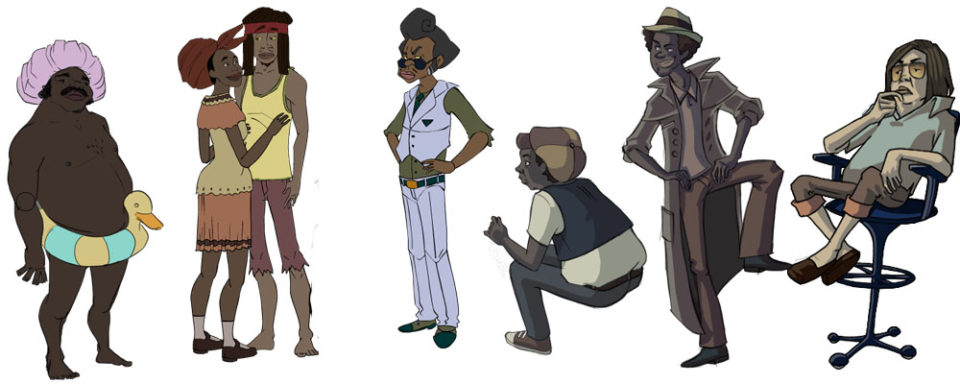
“People loved the story and the art. It reminded them the style of the old adventure games from the past. When I was observing people who were playing, I was trying to figure out where they would get stuck in the flow and then add dialogs that would hint towards how to solve the problem that they were at,” they noted. “I was trying to minimize the frustration from not being able to understand how to solve a specific puzzle.”
On the subject of inspiration Oded says, “I bring in stories from my own personal life and fictionalize them. Sometimes it’s trivial things, sometimes it’s very deep. I also draw a lot of inspirations from Sitcoms and comedies I watch on TV and movies.”

Comments


